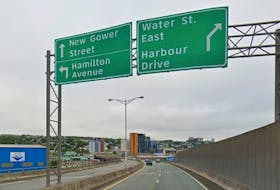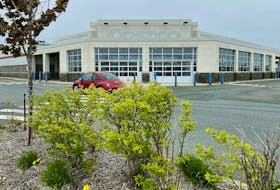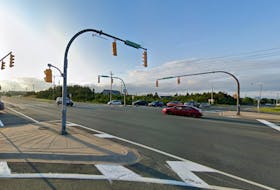The Government of Newfoundland and Labrador has introduced more of its plans for the legalization of cannabis, including allowing the growing of plants at home.
Four pieces of legislation were revealed Monday and are being debated this week — the last week scheduled for the spring session of the House of Assembly.
“I expect it’s going to be a very long week in the House,” Progressive Conservative MHA Paul Davis said after highlighting some of his lingering questions to reporters, while raising more later in the day on the House floor.
RELATED STORIES:
Cannabis legislation will get the time it needs: N.L. Liberals
Loblaws qualifies for 10 licences to sell cannabis products in N.L.
Related Link:
New York Times: How much weed is in a joint?
The Liberals have a trio of cannabis-related amendments: to the Smoke-Free Environment Act, the Liquor Corporation Act and the Highway Traffic Act.
There’s also a significant new piece of legislation called the Cannabis Control Act.
At home
Should the provincial bills pass as expected, people will be able to grow up to four cannabis plants at home in Newfoundland and Labrador.
If there’s more than one legal adult, the household limit is still only four plants for the house or apartment.
Selling those plants, or just part of them, will be illegal.
But people will be able to smoke at home, making use of their own plants or purchased product from a retailer licensed by the Newfoundland and Labrador Liquor Corp. (NLC).
Adults 19 and older will be legally OK to have up to 30 grams of cannabis in their possession. For scale on that, The New York Times reported in 2016 that the average amount of weed in a standard joint is 0.32 grams, based on a study of federal drug arrest data in the United States, published in the journal Drug and Alcohol Dependence.
Unlike your car, the police won’t be able to search your home for violations related to the cannabis laws without a warrant from a provincial court judge (but search with your consent is also allowed).
Cannabis can be shared with other adults, so long as you don’t go above the possession limit, but edibles — including things like homemade marijuana brownies — are still not covered.
On the road
Police already monitor for drugged driving in the province, but there are a few points worth noting ahead of cannabis legalization.
First off — and even if it goes without saying — you can’t smoke cannabis when you’re driving (or boating).
If you’ve just popped by the nearest retailer, your purchase has to stay in its sealed container when it’s in your vehicle and can’t be opened and made readily available to a driver or passenger. In that way, it’s being treated like alcohol.
Police and designated inspectors will be able to stop and search your vehicle without a warrant. Purchases outside of province will still have to be limited to the possession limit and meet all regulations in this province for packaging and protected transport.
Transportation of cannabis by producers and retailers will only be allowed through “common carriers” such as Canada Post and Purolator, with exact carriers to be determined by cabinet, in regulations still to come.
At the shop
The NLC still holds the power to issue the retail licences for cannabis, but the new Cannabis Control Act would add tighter controls, including a requirement for public notice before a cannabis shop can open.
The NLC has the power to hold a hearing on any cases where there’s public objection, or it determines a need for review.
Licences from the NLC are issued for up to five years at a time and can be transferred with a change in business ownership, but also can be challenged, suspended or revoked as the liquor board sees fit (with two years to challenge its decision).
Retailers are going to be under close watch.
They’re not allowed to have vaping or smoking of the product in their stores, and can’t have minors handling cannabis product.
They have to display their cannabis licence to the public, comply with a federal seed-to-sale tracking system (an aid for assuring legal product), and be subject to spot audits and inspections by the NLC and police.
Retailers can buy only from NLC-approved producers and can sell only in approved packaging.
They can’t give away cannabis, which axes the “free for a year” promotions.
They also can’t sell to anyone who is intoxicated, as per their best assessment.
Federal legislation prohibits minors from even seeing cannabis products displayed, so minors can’t go in standalone cannabis shops, while mixed-use locations will have to keep all products and advertising — for cannabis and accessories — out of view.
Online, on the street
You can’t be high on marijuana in a public place. And it’s not OK to smoke it in a public place.
Wherever you can’t smoke cigarettes, including in a workplace, you won’t be able to smoke or vape marijuana.
Cannabis products won’t be legally sold through a vending machine, or any other self-service system.
The NLC will establish an online store, and any others will have to be permitted first through cabinet and then by the NLC. Save for the corporation’s site, the new act states, “a person in the province shall not purchase, attempt to purchase, obtain or attempt to obtain cannabis online or through a website.”
The NLC will determine the products to be listed for sale and their prices.
Age restrictions will be enforced online in an approach similar to the system used for sale of lottery tickets. The next step comes in deliveries, where the common carriers like Canada Post demand ID for proof of age, and signatures, as per the regulations set at the federal level, before releasing cannabis product.
The new act provides for penalties, with the steepest penalties being related to public health and access for minors. Youth possession, for example, could result in their facing a $100 fine. However, sale to a person under the age of 19 or an intoxicated person could lead the seller to a fine of up to $100,000, or two years in jail.








